Featured here is a sampling of projects launched by the Clinic.
Justice Tablets Project – Bridging the Digital Divide

The Justice Tablets Project is a collaboration between The Legal Aid Society’s Civil Practice, (LAS) and Columbia Law School’s Lawyering in the Digital Age Clinic. The goal was to find the least expensive, user-friendly, most reliable internet connected device that will be lent to clients to who are unable to come to Legal Aid offices for assistance or need to participate in virtual proceedings to prevent their evictions. By helping to bridge the digital divide, we can improve access to justice.
Housing Case Online Resource (HCOR)
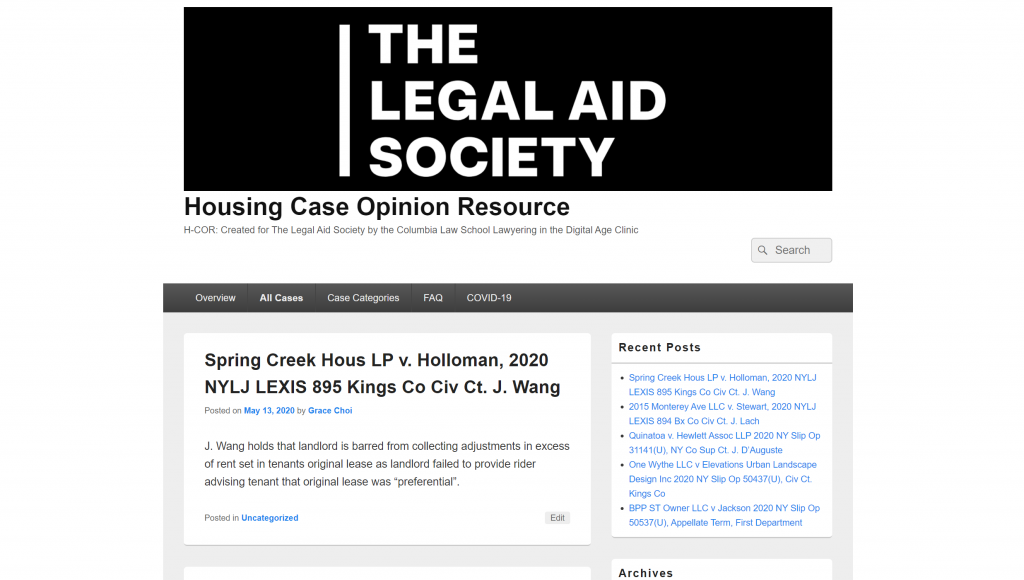
Clinic students created HCOR, the Housing Case Online Resource for The Legal Aid Society. HCOR is a free, curated, searchable, password-protected online resource of important judicial opinions with precedential value in landlord-tenant cases. Many of the cases are not available through expensive, subscription-based research tools like Westlaw and Lexis. The goal is to provide public interest lawyers working as part of NYC’s historic “Right to Counsel” initiative with a critical grasp on the wealth of opinions that can help them prevent evictions and homelessness. During the pandemic students uploaded more than 1000 cases, created a COVID-19 area containing Executive Orders and emergency resources, added information on virtual lawyering and trained new attorneys.
WNYLC Bankruptcy Assistant
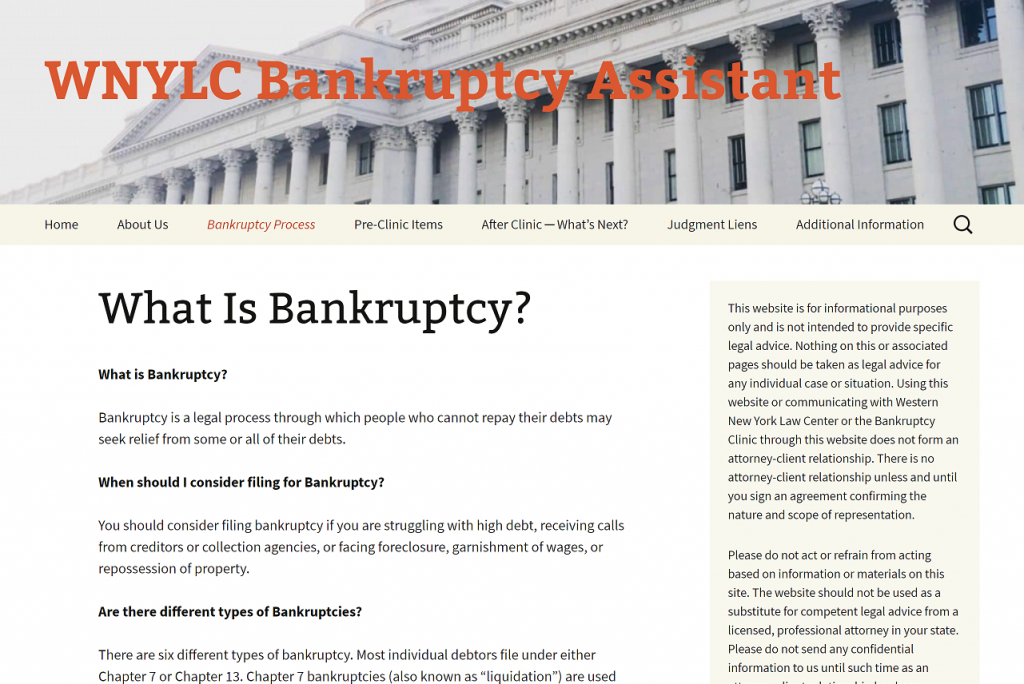
During the Spring, 2020 semester, the Clinic worked with attorneys from the Western New York Law Center (WNYLC), to provide aid to clients navigating the complex bankruptcy process. Students from the Clinic created and maintain a website that provides an intake feature which will streamline the Law Center’s process to screen and determine which clients are eligible for its services and enable them to use their limited resources with enhanced efficiency. The site also contains digitized versions of the required forms to be submitted to court, trustees, or creditors for reference and easy access. The site additionally provides users with general information on the bankruptcy process, addressing clients’ questions concerning whether bankruptcy is right for them and what the ramifications of filing are for the clients. The WNYLC is located in Buffalo, NY, an area still reeling from the Great Recession and now hit hard by COVID-19. There is no doubt that facilitating the birth of the WNYLC Bankruptcy Clinic will help public interest lawyers accommodate the surge of bankruptcies resulting from the economic impact of the virus. Clinic students working on the project: Nicholas Celli ‘21, Grace Choi ‘21, and Noah Sosnick ‘20.
Data Analysis of Impact of COVID-19 on Unemployment and Housing in NYC
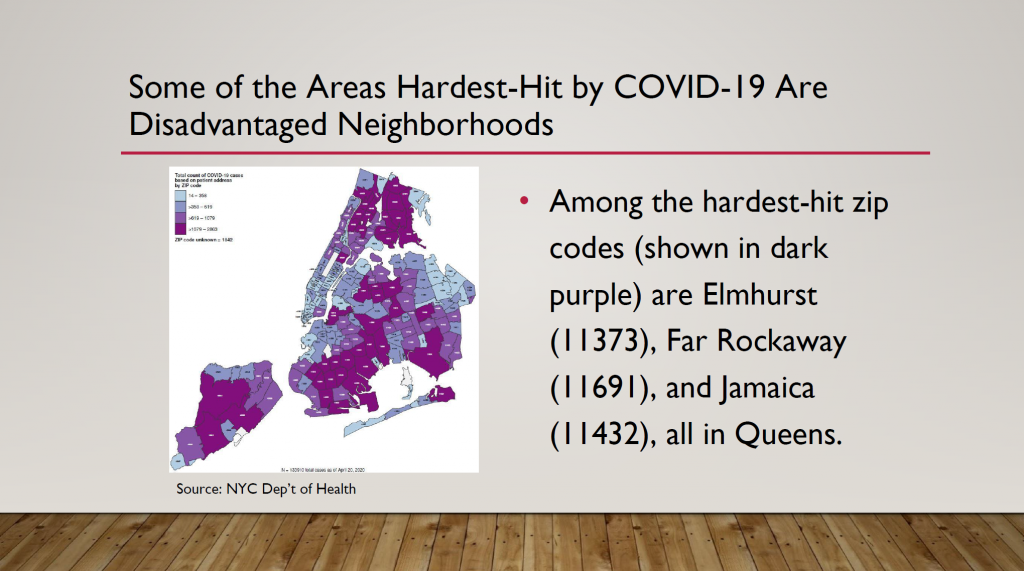
Students for the Lawyering in the Digital Age Clinic, who had been working with the Legal Aid Society originally on a project that analyzed court data on eviction cases to aid advocates in preventing evictions, quickly shifted gears upon the eruption of the COVID-19 crisis and used data from a variety of sources to identify at-risk clients and populations. In conjunction with The Legal Aid Society, clinic students presented their findings and recommendations to members of the NY State Senate, NY State Assembly, and policy aids to the New York City Council. Students on the project: Quinn Marie Leary ‘20, Yahel Kaplan LLM ‘20 and Mengyi Tu ‘21.
Clinic Attacks Zombies
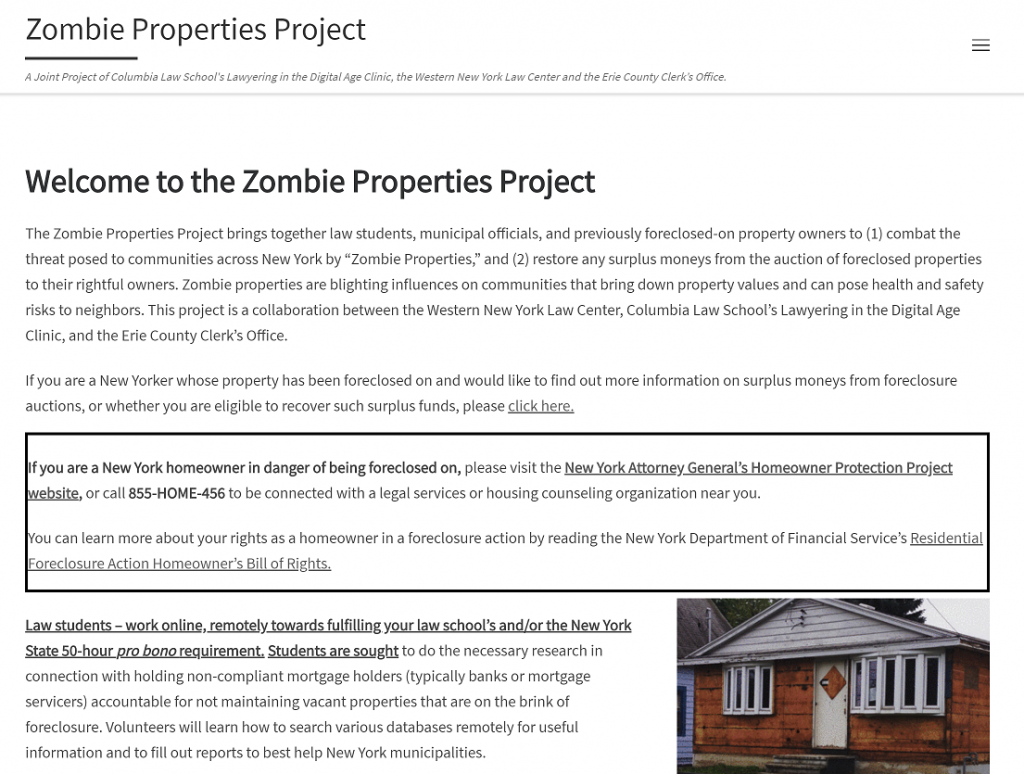
Columbia Law School’s Lawyering in the Digital Age Clinic joined with Erie County and the Western New York Law Center to help Erie County municipalities track and monitor “zombie” foreclosures – vacant, deteriorated homes that were abandoned by their owners in the face of foreclosure threats. Through this first-of-its-kind partnership, clinic students created and maintain a website that allows student volunteers to conduct online research on these properties for participating municipalities and track down the bank or servicing agents who should be held accountable under the new law. Click here for an article about the project. Clinic students on the project: David Balme ‘19, Benjamin Cormak ‘19, Lisa Cha ‘18, Amanda Paige Ellen ‘19, Yaffa Leah Gopin ‘19, Song Yi “Mary” Han ‘20, Arthur Muszinski ‘19, Edgar Okorie ‘20, Andrew Shanahan ‘19, Minah So ‘20, Maya Uchima ‘19, Andrew Watiker ‘18.
Earned Income Tax Credit Portal
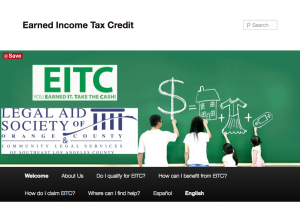
In partnership with the Legal Aid Society of Orange County and Community Legal Services of Southeast Los Angeles County, the Lawyering in the Digital Age Clinic created an Earned Income Tax Credit online information portal. This portal, available in both Spanish and English, gives users an overview of the EITC benefit, eligibility requirements, and filing process. In addition, portal users have access to an eligibility calculator, filing forms, and a list of resources for free help with filing for the EITC. The portal is designed to be an online “one-stop shop” for anyone to learn more about the EITC program: Clinic students created the portal to break down seemingly complex tax-filing information into straightforward language that is accessible to the public. The project aimed to address the overwhelming unmet demand for free civil legal services. Clinic students who worked on the projects are Elli Cho ’16, Jerald Khoo ’16, Mindy Lin ’16, Alison Liou ’17, Kayasha Lyons ’17, Marcus Tan ’16, and Christine Tse ’17.
To learn more about this project, click here.
Elder Artists Project
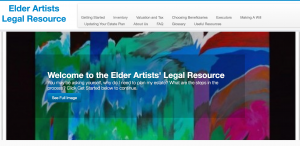
The Clinic, in partnership with the Research Center for Arts and Culture at the National Center for Creative Aging, created the Elder Artists’ Legal Resource, a unique online resource that provides step-by-step instructions to encourage creators to ensure their work lives on beyond them. The online tool offers intuitive, easy-to-understand guidance for artists who want to inventory their work, document its value, and protect it posthumously. Written in plain language and providing simple templates for creating an inventory, the site offers information for visual artists who want to understand the estate-planning process, gain access to valuable resources, or prepare to engage legal services.
To learn more about this project, click here.
Krimstock
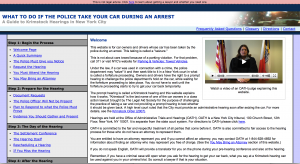
The Clinic teamed up with judges at the New York City’s Office of Administrative Trials and Hearings (OATH) and the Legal Aid Society over three years to create a website to help people who had their cars confiscated during an arrest retrieve information on how to get them back. The process by which one asks to have their car returned is called a Krimstock hearing (hence, the name of the project). The website provides a comprehensive guide for people who wish to bring a Krimstock hearing case, whether or not they have a lawyer. It describes car owners’ rights and guides them step-by-step through the entire hearing process, from requesting a hearing to recovering the car from the police impound. This website provides a comprehensive guide for people who wish to bring a Krimstock hearing case, whether or not they have a lawyer and features videos from judges explaining the process. It also describes car owners’ rights and guides them step-by-step through the entire hearing process, from requesting a hearing to recovering the car from the police impound.
To learn more about this project, click here.
Project FAIR
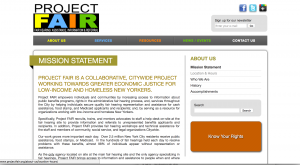
In this project, the Clinic partnered with NYC’s Project FAIR (Fair Hearing Assistance, Information & Referral) to consolidate its online resources. The Clinic also created and maintained an online database which contained records and information collected by the volunteers at Project FAIR. This database now contains more than 17,000 entries and enables the volunteers to track systemic trends in real time. Clinic students also helped to raise awareness on overcrowding at the City’s welfare job centers.
To learn more about this project, click here.
Nonprofit Compliance Checklist
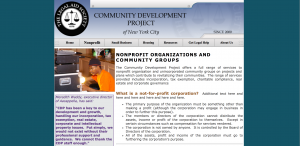 In collaboration with the Legal Aid Society, Clinic students created the Community Development Project webpage. The webpage helps nonprofits figure out the intricacies associated with compliance. Creating and making sure nonprofits stay in compliance is a complex multi-step process. Clinic students have alleviated some of the confusion by developing a checklist available for download from the webpage.
In collaboration with the Legal Aid Society, Clinic students created the Community Development Project webpage. The webpage helps nonprofits figure out the intricacies associated with compliance. Creating and making sure nonprofits stay in compliance is a complex multi-step process. Clinic students have alleviated some of the confusion by developing a checklist available for download from the webpage.
A2J Pro Se Guided Interviews
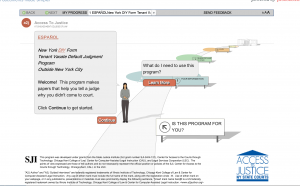
Clinic students created two guided interviews for New York tenants using a website called Law Help Interactive (powered by Probono.net). These interactive guided interviews enable tenants who do not have access to resources to create legal documents that can be presented in court. The interactive “do-it-yourself” guides are available in English, Spanish, Chinese, Korean, Vietnamese, French, and Polish.
To experience the New York DIY Form Tenant Vacate Default Judgment Program, please click here.
Collateral Consequences of Criminal Charges (Four C’s)
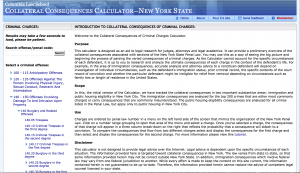
The Collateral Consequences initiative has been an ongoing project in the Clinic since 2005. It was originally developed with the former Chief Judge of the State of New York, Hon. Judith S. Kaye and continued with the Chief Judge Hon. Jonathan Lippman, his staff and the New York State Judicial Institute. Programming and other technical support has been provided by the Columbia Center for New Media Teaching and Learning.
The web based analytical tool – developed in partnership with Columbia Law School professor Conrad Johnson – is a “calculator” that allows legal practitioners to quickly and easily compare the collateral consequences of criminal charges associated with sections of the New York State Penal Law. The Collateral Consequences Calculator serves multiple communities: faculty can build case studies around it, lawyers can better counsel their clients, judges can assure appropriate sentencing, and public policy researchers can use it as a lens through which to examine the matrix of the New York State legal system. Judge Judith Kaye, former Chief Judge of New York State, supported the development of this tool, which she saw as a valuable social justice initiative.
A presentation by Professor Conrad Johnson and Brian Donnelly describing the project is available on the Legal Information Institute webpage.
To learn more about the project, please click here.
For more coverage of the Collateral Consequences Initiative, please click here.
SALT
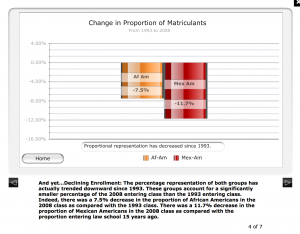
In this project Clinic students, in collaboration with the Society of American Law Teachers (SALT), created a website that documented the disturbing drop in enrollment by African-American and Mexican-American students in United States law schools. Even though African-American and Mexican-American students had been applying to law schools in relatively constant numbers over the past 15 years up to 2008, the year of this project, their representation in law schools had been falling.
To learn more about the project, click here.